Special gains

Labhavishesha Prakarana

 hen a courtesan is able to realize much money every day from numerous customers, she should not confine herself to a single lover. Under such circumstances, she should fix her rate for one night, after considering the place, season, people, her own beauty and good qualities, and the comparative rates of other courtesans. She can then inform her lovers, friends, and acquaintances about her charges. If, however, she can obtain this from a single lover, she may resort to him alone, and live with him as if she had been solely reserved for him.
hen a courtesan is able to realize much money every day from numerous customers, she should not confine herself to a single lover. Under such circumstances, she should fix her rate for one night, after considering the place, season, people, her own beauty and good qualities, and the comparative rates of other courtesans. She can then inform her lovers, friends, and acquaintances about her charges. If, however, she can obtain this from a single lover, she may resort to him alone, and live with him as if she had been solely reserved for him.
Gold Is the Most Valuable
The sages are of the opinion that when a courtesan can gain equally from two lovers at the same time, she should give preference to the one who would give her what she wants. But Vatsyayana asserts that preference should be given to the one who gives her gold, because it cannot be taken back like other things; it can be easily received, and can procure anything wished for. Gold is superior to silver, copper, bell-metal, iron, pots, furniture, beds, upper garments, under vestments, fragrant substances, vessels made of gourds, ghee, oil, corn, cattle, and other such items.

The mischievous nayika, full of flirtatious exuberance seduces a sage by embracing him.
Choosing between Two Lovers
When the same effort is required to win over any two lovers, or when both will give her the same kind of comforts, the choice should be made on a friend's advice, or on their personal qualities, or signs of good or bad fortune connected with them.
Of two lovers, one of whom is attached to the courtesan, and the other is merely very generous, the sages say preference should be given to the generous lover. But Vatsyayana is of the opinion that the one who is really attached to the courtesan should be preferred because he can be made to be generous, even as a miser gives money if he becomes fond of a woman; but a man who is simply generous cannot be made to love with real attachment. But if two lovers are attached to her, and there is a choice between one who is poor, and one who is rich, the preference is of course to be given to the rich lover.
When there are two lovers, one of whom is generous, and the other ready to do any service for the courtesan, some sages say the latter should be preferred. But in Vatsyayana's opinion such a man thinks he has gained his object by performing this service once, but a generous man does not care for what he has given before. Even here the choice should be guided by the likelihood of the future good to be derived from her union with either of them.
When one lover is grateful, and the other liberal, some sages say the liberal one should be preferred, but Vatsyayana affirms that the former should be chosen, because liberal men being generally haughty, plain-spoken, and inconsiderate, do not care for long friendships or past services, and leave abruptly if they see any fault in the courtesan, or are told lies about her by another woman. On the other hand the grateful man does not break off from her at once, because of his regard for the pains she may have taken to please him. Here too the choice should depend on the future.
When there is a choice between complying with the request of a friend, or a chance of getting money, the sages say the latter should be preferred. But Vatsyayana believes that money can be obtained tomorrow as well as today, and, therefore, the future good should be considered before disregarding a friend's request. But on such an occasion, the courtesan could pacify her friend by pretending to be busy and promising to comply with his request the next day, and thus, also obtain the money offered to her.
When there is a choice between getting money and avoiding a disaster, the sages suggest the former. Vatsyayana disagrees and asserts that money only has a limited importance, while a disaster once averted may never occur again. The choice should be guided by the potential size of the disaster.
Use of Wealth by Courtesans for Piety
The riches of the ganikas, the wealthiest and best kind of courtesans, are to be spent in building temples, water-tanks, and gardens; giving a thousand cows to different Brahmins; worshipping the gods, celebrating festivals in their honor; and lastly performing such vows as may be within their means.
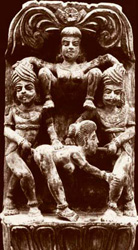
By using their skills in the art of giving pleasure two experienced courtesans entertain a highly virile group of young men.
Other courtesans should spend their acquired wealth on wearing a a clean dress every day; sufficient food and drink to satisfy hunger and thirst; eating a perfumed tambula, a mixture of betel nut and betel leaves daily; and wearing gilt ornaments. The sages say these represent the gains of all the middle and lower classes of courtesans, but Vatsyayana says that these cannot be calculated as they depend on the influence of the place, the customs of the people, their appearance, and other indefinable things.
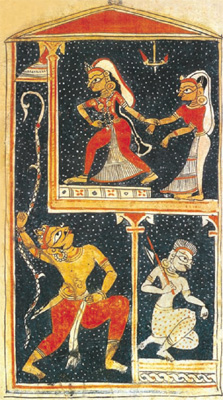
A 14th century miniature from the manuscript Laur Chanda. The two lovers escape with the help of her maid and a lax guard.
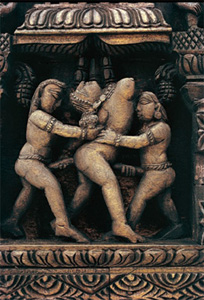
Two frisky and sportive mates take delight in recreating with a highly buxom and voluptuous Hastini nayika.
When to Forego or Extract Money
A courtesan should forego a great reward and agree to take only a small sum of money in a friendly way from a man if she wishes to keep him from other women; get him away from some woman to whom he is attached; deprive some woman of her acquired riches; raise her position; enjoy some great good fortune; become desirable to all men by uniting herself with him; wishes for his assistance to avert some misfortune; is really attached to him; wishes to injure somebody through his influence; remembers some former favor conferred upon her; or wishes to be united with him merely from desire.
When a courtesan intends to abandon a particular lover, and take up with another; or believes he will shortly leave her, and return to his wives; or having squandered all his money and become penniless, he will be taken away by his guardian, or master, or father; or he is about to lose his position; or he is very fickle, she should endeavor to get as much money as she can from him as soon as possible.
On the other hand, when the courtesan thinks her lover is about to receive valuable presents; or is expecting his ship laden with merchandise; or is to get a place of authority from the king; or is soon to inherit a fortune; or has large stocks of corn and other commodities; or will regard with favor anything done for him; or is always true to his word; then should she have regard to her future welfare, and live with him like his wife.
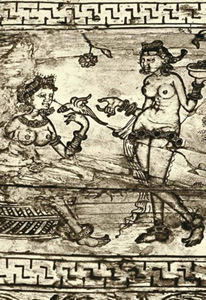
One of the 2nd century Begram Ivories portrays two full-hipped, narrow-waisted courtesans, decked with heavy jewellery.
Some shlokas state:
In considering her present gains, and her future welfare, a courtesan should avoid such persons as have gained their means of subsistence with very great difficulty, as also those who have become selfish and hard-hearted by becoming the favorites of kings.
She should make every endeavor to unite herself with prosperous and well-to-do people, and with those whom it is dangerous to avoid, or to slight in any way. Even at some cost to herself she should become acquainted with energetic and liberal-minded men, who when pleased would give her a large sum of money, even for very little service, or for some small thing.
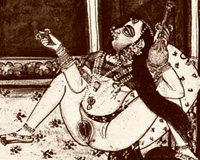
An intoxicated courtesan sits in an inviting pose with her legs wide apart.

A courtesan should make every endeavor to unite with prosperous and liberal minded people, whom when pleased, would give her large sums of money even for a very little service.